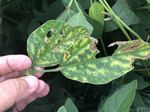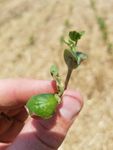2021 Soybean Variety News - Renwood Farms
←
→
Page content transcription
If your browser does not render page correctly, please read the page content below
Renwood Farms
2021 Soybean Variety News
Trait Choices Increase for 2021 by Paul W. Bodenstine, agronomist
A soybean variety’s weed control system has be- Last week, EPA approved new registrations for
come the driver of seed decisions for many growers. XtendiMax and Engenia and extended the registra-
Weeds resistant to multiple herbicide mode of action tion for Tavium. These new registrations will expire
(MOA) drove the market to adapt dicamba genetics. in 2025. Probably the biggest change for Mid-
Atlantic Xtend producers is the June 30 deadline
for application for use on soybeans. This will im-
pact double-cropped soybeans.
Soybean Herbicide Trait Choices for 2021
New XtendFlex® soybeans are now available to
provide farmers with triple-stacked tolerance to
dicamba, glyphosate and glufosinate (Liberty®).
Built on the high-yielding Roundup Ready 2 Xtend®
technology, farmers get additional tolerance to
glufosinate for more flexibility and herbicide choices
to manage weed control challenges. There is a lim-
ited amount of seed available for 2021.
Roundup Ready 2 Xtend soybeans have been
adapted so quickly by the US soybean market due to
the high yields and an effective system to control re-
sistant weeds despite complex application require-
ments and drift damage issues in some markets.
In VA/NC OVT variety trials, over 85% of the top
yielding varieties trials since 2018 have been Xtend
Within two years of introduction, 43% of all US soy- varieties. The yield response with lower planted pop-
bean acres were planted in dicamba-tolerant seed, ulations has been impressive.
according to the USDA (graphic above).
Enlist E3® soybeans offer three herbicide tolerances
Notably, not all fields planted in dicamba-tolerant (2,4-D choline, glyphosate and glufosinate) to deliver
traits receive dicamba. In Mississippi, 79 percent of a system with multiple weed MOA options. Our best
soybean acres were planted with dicamba-tolerant results in 2020 came with tank mixing 1 qt./acre each
seeds, but only 54 percent of these acres were of Roundup, Liberty and Enlist One.
treated with dicamba. In some cases, farmers may
only use dicamba if glyphosate-tolerant weeds ap- The Enlist E3® system has afforded less stress about
pear. In other cases, dicamba-tolerant seeds are drift or volatilization. We recommend it to be your first
planted to prevent yield losses from unintended ex- choice where any off-target movement causes con-
posure to dicamba. cern. Yields have not been as impressive as Xtend
genetics but we expect this yield gap to narrow with a
On June 3, 2020, the U.S. Ninth Circuit Court of Ap- vastly improved 2021 genetics line-up.
peals issued a decision to vacate three dicamba
herbicides, XtendiMax (Bayer), Engenia (BASF) and There are other herbicide traits available but supplies
FeXapan (Corteva Agriscience). The Court decid- are limited due to weak demand because of signifi-
ed that the EPA did not have enough evidence to cant yield differences in the new auxin-based genet-
support its approval and also underestimated and ics. These include Roundup-Ready, Liberty-Link and
ignored risks posed by the herbicide. Tavium, the GT-27 varieties. There are also conventional soy-
Syngenta dicamba herbicide entry, was not included beans available for sale in 2021.
at that time. Pre-emergence Herbicides
RENWOOD FARMS · WWW.RENWOODSEED.COM · 804-829-24502021 SOYBEAN VARIETY NEWS
Page 2
Renwood Farms Featured USG Varieties for 2021
Variety Traits RM Notes
NEW! Three-way herbicide tolerance: Roundup, Liberty and dicamba.
Xtend Flex, A medium height, semi-bushy gray bean. Very vigorous emergence
7441XF 4.4
SCN with excellent standability. This variety is resistant to stem canker and
frogeye leaf spot with PI88 gene for SCN 3 and 14.
NEW! Three-way herbicide tolerance: Roundup, Liberty and dicamba.
A medium height, semi-bushy light tawny bean. Very vigorous emer-
7481XF Xtend Flex 4.8
gence with excellent standability and stress tolerance; for lighter soils.
This variety is resistant to stem canker and frogeye leaf spot
Top yield in 2019 VT, DE and MD OVT. Strong emergence in cooler
Xtend, soils, excellent charcoal rot resistance for lighter soils and very good
7447XTS 4.4
STS, SCN against Sudden Death Syndrome (SDS). Light tawny pods means
better resistance to purple stain
Top-yield in 2019 VT-OVT for full-season (fs). Excellent resistance to
7480XT Xtend, SCN 4.8 stem canker. Excellent shatter resistance with strong emergence and
stands well; this is a tawny, semi-bushy variety
The only MG4 Xtend variety with moderate resistance to Root Knot
Xtend,
Nematode! A light tawny pod with resistance to stem canker and
STS,
7496XTS 4.9 Sudden Death Syndrome with a semi-bushy structure makes this
RKN
perfect for early or double-cropped (dc) fields; with STS trait for herbi-
SCN 3 & 14
cide flexibility
Top MG5 in NC-OVT. This is a hard charging, high yield bushy soy-
7529XTS Xtend, STS 5.2 bean with stem canker resistance for planting after soils warm in May;
with the STS trait
A gray bean with resistance to stem canker and frogeye leafspot: very
7451ET Enlist 3 4.5 good against Sudden Death Syndrome. Strong emergence and
standability
Enlist 3, A gray bean with resistance to stem canker and frogeye leaf spot with
7471ETS 4.7
STS, SCN PI88 gene for SCN 3 and 14; excellent emergence and stress tolerant
A gray bean that performs on lighter and heavier soils. With superior
7480ET Enlist 3 4.8 stem canker and above average frogeye resistance. Above average
tolerance to Sudden Death Syndrome .
Averaged 49 bu./acre in 2019 VT-OVT dc trials. Performs on lighter
Enlist 3,
7491ET 4.9 soils. With superior stem canker and above average frogeye re-
STS
sistance
A tawny conventional soybean from VA Tech. It is a high-yielding
soybean with excellent brown spot, stem canker and frogeye re-
5618V CON 5.6
sistance. It has good emergence and stands well with a medium-
height and semi-bushy structure
RENWOOD FARMS · WWW.RENWOODSEED.COM · 804-829-24502021 SOYBEAN VARIETY NEWS
Page 3
Regardless of weed control system selected, resid- It will help to note which fields showed SDS symp-
ual herbicides are still recommended. VA Tech re- toms and select varieties with some resistance and/
leased a chart showing that certain residual herbi- or add a seed treatment to control.
cides cause crop injury with some degree of fre-
In 2020, soybeans in many fields got infected by soil-
quency.
borne fusarium blight or seed-borne fusarium, two of
On coarse/ sandy soils, VT gave an “Excellent” or several fusarium species that plague soybeans in the
“Very Good” (rare crop injury) to soil applied herbi- Mid-Atlantic.
cides Dual, First Rate, Spartan, Zidua and Outlook.
Fusarium infections cause roots turn dark brown to
Of the premixes, only Authority First, Anthem Max black. There are no red lesions on stems like rhi-
and Prefix were noted as “Very Good” for being soil zoctonia. Cotyledon leaves become yellow and
applied pre-plant or pre-emerge. Avoid choosing drop off. Fusarium species are worst when soy-
residual herbicides that cause crop injury especially beans are planted under warm/hot conditions in
when planting into cool soils. slightly acidic sandy soils. Nematodes can increase
pressure by wounding roots to open pathways for
Metribuzin (Sencor) is still a good option when ap-
infections.
plied at least 30 days prior to planting.
Post-emergence Herbicides
When applying any of the post-emergence herbi-
cides, it will be necessary to add a Group 15 herbi-
cide such as Dual, Outlook or Zidua to the tank to
extend weed control (“layered residual”).
Observations from 2020
Growers are still planting soybeans too thick espe-
cially in double-cropped beans. High planting den-
sity reduces yield by suppressing production of leaf
sugars, proteins, ammino acids and chlorophyll. It
reduces nitrate reductase activity which is key for Fusarium soil
disease protection and nutrient utilization. infection
Higher planting populations increase lodging, in-
crease plant competition for nutrients and increase
disease pressure. Overpopulation reduces the
number of branches, pods and seeds.
Sudden Death Syndrome (SDS) showed up in Fusarium soil
2020 (see photo below) likely due to a very chilly infection
and wet May.
Fusarium seed
infection
RENWOOD FARMS · WWW.RENWOODSEED.COM · 804-829-2450Renwood Farms
C/o agsystems
115 Hanover Ave. #4
Ashland, VA 23005
For questions or orders, please contact:
Office: 804-829-2450
Paul Bodenstine (agronomist): 804-314-7463
Call us with questions! Pre-pay options and dis-
counts available on seed and seed treatments!
Observations from 2020 (continued from page 3)
Even when plants emerge and start to grow, the in-
fections continue to spread. Most growers think that
when a seed has emerged, trouble is over. But that RenPro Plus™ rizNate seed treat-
is simply not true. Diseases continue to spread and ment. A healthy soybean root system:
build populations inside the plant. These infections Note the deep tap root and heavy
lower yields and impact plant and seed develop- nodulation
ment.
The pictures shown at right show a normal, healthy
soybean root system with a plant treated with
RenPro™ Plus rizNate (at top) compared to a
fusarium- infected root system from a plant with an-
other seed treatment (at bottom). Part of the cause
was the 82F average daily temperature in July in
Central VA. Depending on the infection intensity,
RenPro™ soybean seed treatment improved yields
from 4 to 16 bu./acre.
RenPro™ seed treatment is the ONLY seed treat-
ment available that protects against diseases that
occur under warm/hot soil conditions as well as cold
soil conditions. This treatment also provides:
• Cleaner seeds as they remove fungal pathogens
carried on the seed from last season
• Molybdenum to regulate nitrogen uptake and utili-
zation and enhance disease resistance
• Insecticide for protection from above and below
ground insects
• Biological microbes to stimulate plant growth and
protect roots from soil pathogens (RizNate™)
• Nematode protection with Bio-ST®
USG soybean varieties treated with RenPro™ seed
treatments have produced higher yields more often
than any other soybean seed treatment system in on
-farm tests.
“Fuzzy Roots”. A soybean root system infected
Call us so we can demonstrate the value of the Ren- with fusarium blight on a plant with a different
wood Farms Soybean Production System in your seed treatment: there is no tap root and very
farming operation. few nodules
RENWOOD FARMS · WWW.RENWOODSEED.COM · 804-829-2450You can also read

























































